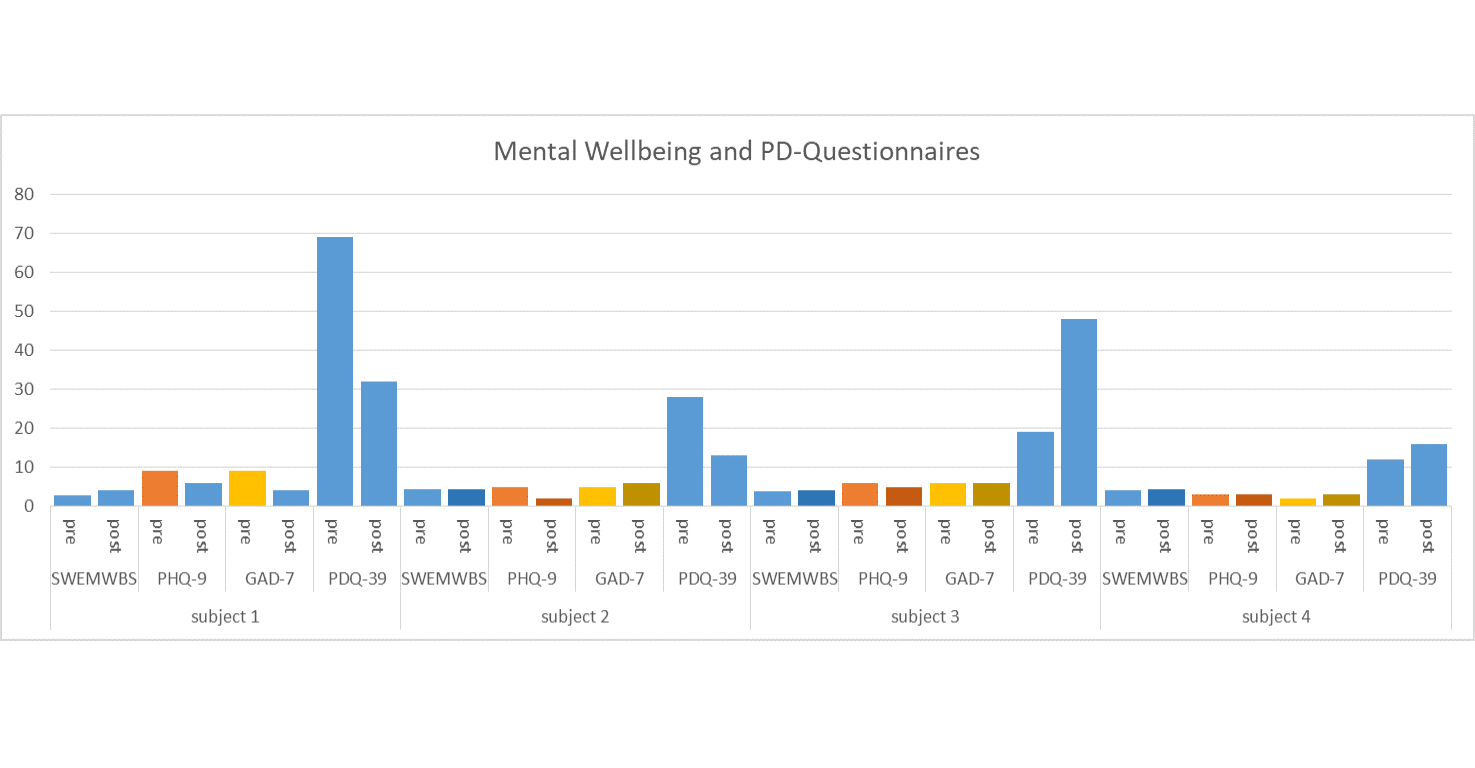Session Information
Date: Wednesday, September 25, 2019
Session Title: Non-Pharmacological Interventions
Session Time: 1:15pm-2:45pm
Location: Les Muses Terrace, Level 3
Objective: The purpose of this study was to transfer ADD training methods into safe training paradigms for PDP, and psychologically framed coping strategies for mood management through integrating the ADD therapy via the Esprit Concrete Method and the Neuroprotective Exercise Protocol (NEP) through the Neurowerkstatt Method [1].
Background: A growing number of PD exercise studies show, that exercise is beneficial for mobility, strength and cardio-respiratory function [2,3]. Environmental enrichment and intensive physical activity are related to neuroprotective and neurorestorative effects in the PD nervous system [4]. Physical exercise rehabilitation programs showed significant positive effects on quality of life in PDP at mild to moderate stages [5]. ADD includes numerous physical tasks of motor learning, that are combined strength and endurance tasks. It improves physical fitness and mental wellbeing [6,7]. ADD can be considered as a safe activity when practiced under expert supervision, combined with emotional wellbeing informed interventions [8].
Method: The questionnaires PDQ39, GAD7, PHP9, SWEMBWBS were used pre and post intervention (3 month). 4 PDP (3m/1f, age: 53-77 y) H&YI-III were included. Additionally qualitative guided interviews were used. Results were described elsewhere [9].4 (45min) training session program combined physical and psychological wellbeing areas of focus through a one day intensive workshop.
Results: GAD-7, PHP-9, SWEMBWBS showed overall mild improvement. PDQ-39 changes were measured in all subjects (see Fig.1).
Conclusion: Our study support current laboratory findings in a practical application setting. PDP Questionnaires additional gain by linking exercise with an emotional-psychological approach and focus. Although subjects reported workshop-limitations [9], these seem manageable in future settings. ADD therapy under expert supervision in a small group seems to be safe and feasible.The methodological quality of this study was low. Sample was small as preliminary.This pilot study preliminarily suggests, that ADD therapy is an exercise possibility for people with mild PD. It has potential to physically improve symptoms and it might optimize disease progression. It also has potential to psychologically improve mental wellbeing. Further research is needed.
References: [1] Schwed & Getrost (2019): Neuroprotective Exercise Protocol (NEP) improves Parkinson’s disease (PD) mobility: transferring evidence into practice. In: Sperlich, B., et al. Ger J Exerc Sport Res 49(Suppl 1): 17. [2] Corcos et al. (2013): A Two Year Randomized Controlled Trial of Progressive Resistance Exercise for Parkinson’s Disease, Mov Dis. 28(9):1230-40 [3] Schenkmann et al. (2017) Effect of High-Intensity Treadmill Exercise on Motor Symptoms in Patients With De Novo Parkinson Disease: A Phase 2 Randomized Clinical Trial. JAMAneur [4] Petzinger et al. (2013): Exercise-enhanced neuroplasticity targeting motor and cognitive circuitry in Parkinson’s disease. Lancet Neurol. 2013 Jul;12(7):716-26 [5] da Silva et al. (2016): Effects of Physical-Exercise-Based Rehabilitation Programs on the Quality of Life of Patients With Parkinson’s Disease: A Systematic Review of Randomized Controlled Trials. J Aging Phys Act.Jul;24 (3):484-96 [6] Dvorak et al. (2017): Effects of Parkour Training on Health-Related Physical Fitness in Male Adolescents. Open Sci. Sports J.,10, 132–140. [7] Río (2016): Feasibility and students’ preliminary views on parkour in a group of primary school children. Phys Educ Sport Pedagogy; 21(3): 281-94. [8] Gilchrist (2011): Lifestyle sport, public policy and youth engagement: Examining the emergence of parkour. Int. J. Sport Policy Politics, 6, 109–131. [9] Schwed et al. (2019): Art du Deplacement (ADD)/Parkour therapy for people with Parkinson’s disease? Applying an extreme sport into rehabilitation training to increase physical and mental wellbeing. In: Sperlich, B., et al. Ger J Exerc Sport Res 49(Suppl 1): 16.
To cite this abstract in AMA style:
M. Schwed, T. Getrost, K. Torchia, G. Yao. Art du Deplacement (ADD)/Parkour therapy for people with Parkinson’s disease (PDP) [abstract]. Mov Disord. 2019; 34 (suppl 2). https://www.mdsabstracts.org/abstract/art-du-deplacement-add-parkour-therapy-for-people-with-parkinsons-disease-pdp/. Accessed April 21, 2025.« Back to 2019 International Congress
MDS Abstracts - https://www.mdsabstracts.org/abstract/art-du-deplacement-add-parkour-therapy-for-people-with-parkinsons-disease-pdp/

